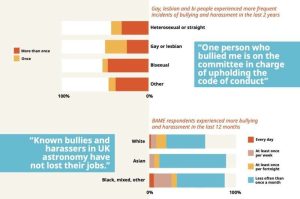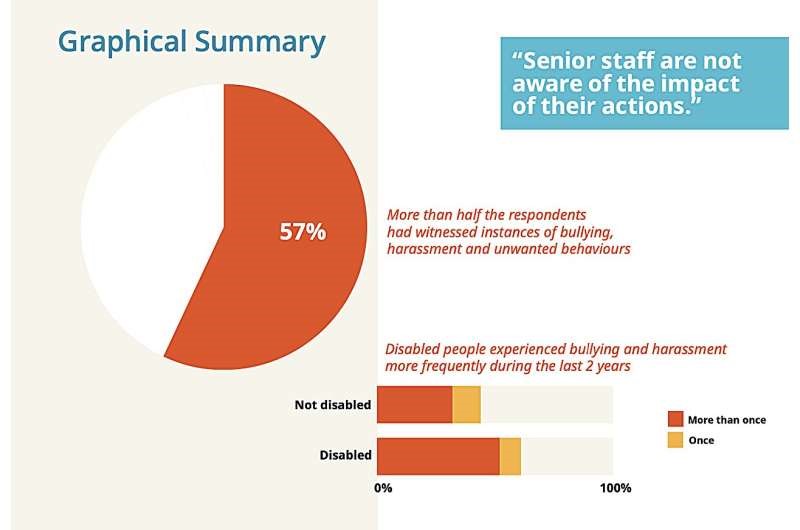“Urgent” action is needed to address an “insidious” and systemic bullying problem within the world of astronomy and geophysics, a report warns.
The Royal Astronomical Society (RAS) has today published a list of recommendations to tackle the issue, after finding that such coercive behavior and harassment is rife within the two sciences.
A survey commissioned by the society showed that disabled people, women, Black and minority ethnic, and LGBTQ+ people are much more likely to be bullied and harassed than men and white, straight, and non-disabled people.
It also found that two-thirds (65%) of respondents who reported complaints felt their concerns had been handled inadequately.
Among the key findings of the “stark” report were:
Disabled, and Black and minority ethnic astronomers and geophysicists are 40% more likely to be bullied than their non-disabled and White colleagues.
Women and non-binary people in the field are 50% more likely than men to be bullied and harassed.
50% of lesbian, gay, bisexual, and queer astronomers and geophysicists were bullied in the 24 months preceding the survey, and 12% of bisexual astronomers reported being bullied at least once a week.
Those at more precarious stages in their careers, for example students and those on temporary contracts, are more likely to be bullied and harassed.
In response, the RAS is calling for the introduction of more effective bullying and harassment policies, procedures and safeguards to protect all colleagues, to support students, and to ensure that everyone can achieve their potential and work in a safe and satisfying environment, regardless of their background.
The society’s proposals focus on three critical areas: prevention, reporting and accountability.
A detailed list of recommendations for individuals, managers, workplaces and organizations are available in the report. They include the need for better support to enable individuals to act, report, or disclose when harm is done, along with clear and transparent procedures for the reporting of complaints.
The RAS hopes that by enacting these recommendations—including actions for the society itself—the fields of astronomy and geophysics can make headway towards becoming a safer and more inclusive workplace.
The RAS Committee on Diversity in Astronomy and Geophysics commissioned the survey, which was then carried out by the society’s education, outreach and diversity officer Dr. Sheila Kanani and then RAS diversity officer Dr. Aine O’Brien.
Prior to this study no data capturing the extent of bullying and harassment among astronomers and geophysicists had been collected.
“The report release is a stark and timely reminder of the bullying and harassment issues we have in our sector, and wider,” said Dr. Kanani.
“It is good to have baseline data to provide evidence behind the work that we’re doing. What followed from the data analysis is a set of recommendations for individuals, organizations and universities. This is where the work really starts!
“We are hoping that universities will sign up to our recommendations in due course. In addition to these recommendations, we have also published a set of actions for the RAS, to demonstrate our commitment to making our sector a better place, for our staff, Fellows and colleagues.”
RAS president Professor Mike Lockwood said, “The evidence in this report is a wake-up call to everyone in the world of astronomy and geophysics.
“The first step to solving any problem is to admit that there is one, and to gather evidence about the scale and nature of it. Now we have done that, it is clear the issue is both insidious and systemic.
“It requires urgent cultural change among organizations, institutions and individuals themselves to address what is currently an unacceptable situation.”
Former RAS president Professor Emma Bunce, who was instrumental in the survey, added, “The results presented in this report are bleak; they form a powerful case for change.
“The RAS is committed to supporting our community, and we strongly support further investigation of this issue across the broader science sector and the implementation of workplace policies and procedures that deliver positive change.”

The aims of the Bullying and Harassment report were to:
Capture the experiences and perspectives of the astronomy and geophysics community regarding bullying and harassment, workplace culture and policies;
Understand which communities are most likely to be adversely/disproportionately affected by these issues;
Generate a robust dataset as a starting point and baseline for change in the fields.
The survey, which was carried out in 2020, revealed that 44% of the 661 respondents worldwide had suffered some form of bullying and harassment in the workplace within the preceding 24 months.
It also showed that there was not a single demographic group, career stage or career path that had not experienced some form of bullying and harassment in the workplace.
However, there were multiple marginalized communities that stood out as having suffered far more than their colleagues.
Women and non-binary respondents were much more likely to be bullied than men, with 61% of non-binary and other gender respondents and 59% of women reporting being bullied and harassed, compared to 33% of men.
The findings suggest that the efforts of the many woman-focused initiatives in astronomy and geophysics—such as the International Astronomical Union’s Women and Girls in Astronomy Project, and the dedicated awards for women in our field, including the RAS’s Caroline Herschel Medal—are offset by huge additional workplace hardships that many women face.
It also highlights that these initiatives do not represent non-binary and gender-fluid colleagues.
The report found that respondents with disabilities were 40% more likely to be bullied and harassed in the workplace than their colleagues without disabilities.
In the two years prior to the survey, 61% of respondents with disabilities suffered bullying and harassment, compared to 44% of respondents without disabilities.
The report also suggests that LGBTQ+ astronomers and geophysicists are more likely to be bullied in the workplace than their straight/heterosexual counterparts, with 50% of gay or lesbian respondents bullied in the two years prior to the survey, and 53% of bi respondents, compared to 43% of straight respondents.
In addition, the survey found that LGBTQ+ respondents suffered bullying and harassment more often, with 12% of bi respondents bullied at least once per week, compared to 4% of heterosexual/straight respondents.
It is not possible to say whether this bullying was targeted at their sexuality, however, because those who took part in the survey were not asked the nature of the bullying and harassment they suffered.
The report also suggests that Black, Asian and minority ethnic astronomers and geophysicists are more likely to be bullied and harassed than their white peers, with 50% of Asian respondents and 51% of Black, mixed and other heritage respondents reporting being bullied in the two years prior to the survey, compared to 43% of white respondents.
Black, mixed and other heritage respondents were also more likely to suffer frequent bullying and harassment. Fourteen percent of these respondents said they had experienced some form of abuse at least once per week, and an additional 3% every day.
This compared to 4% and 1% of white respondents.
Not only is bullying and harassment systemic and endemic within the sciences of astronomy and geophysics, however, it is also not being tackled effectively, according to the report.
A third of those surveyed said they did not believe their employer took sufficient action to prevent bullying and harassment or unwanted behaviors at work.
They cited unclear reporting procedures, said supervisor relationships made whistleblowing difficult, and added that those in positions of power and influence are perceived as “invincible” and not punished.
The RAS recognizes its role in advocating for equal access to astronomy and geophysics for all, but cannot directly change the policies and procedures of workplaces and organizations in the field.
However, the society hopes that by giving a voice to the experiences of Fellows and colleagues that universities, research councils and other workplaces in the sector will improve their working practices as a result.
Source: PHYS.ORG


